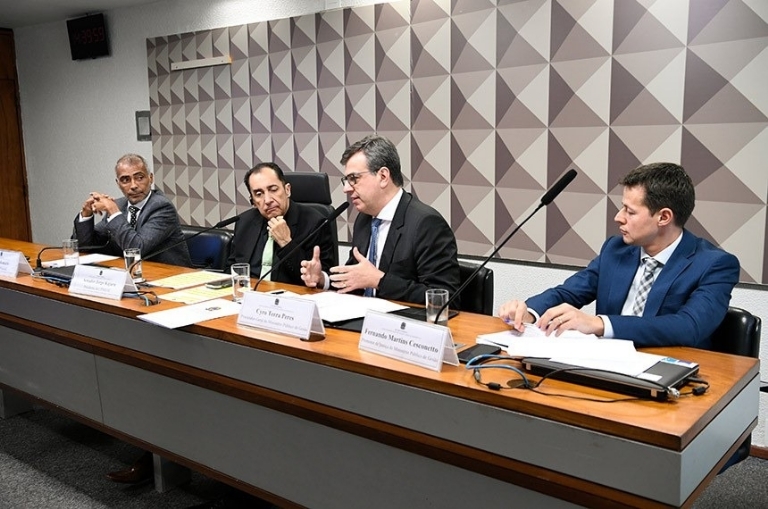

Members of the Public Ministry of Goiás advocated on Tuesday (11) for cooperation between public bodies and sports entities as a way to curb manipulation in sports. They spoke to the Parliamentary Commission of Inquiry on Match Fixing and Sports Betting (CPIMJAE) about Operation Maximum Penalty, which investigates a group accused of offering money to football players to receive penalties on the field.
Attorney general of the Goiás MP, Cyro Terra Peres, and prosecutor Fernando Martins Cesconetto, a member of the Special Action Group to Combat Organized Crime (Gaeco) of the Public Ministry of Goiás and one of the individuals responsible for the operation, were heard as witnesses.
Regarding betting companies, Senator Eduardo Girão questioned whether there is evidence of their involvement in manipulation schemes, while Romário inquired about any complaints made by these companies. The witnesses stated that sports betting houses are victims of this type of manipulation, but they did not report irregularities.
According to Cesconetto, in just one round, bettors made profits of R$ 712,000 (US$ 135,000) through manipulation in five matches, to the detriment of a sports betting house that, despite the loss, did not report any irregularities. Following a question from the rapporteur, the prosecutors mentioned bet365 and Betano as the companies that suffered the most from the investigated manipulations.

Cyro Peres stated that betting companies are "uninterested victims," probably because they already consider potential losses in these cases as part of the cost of doing business. He advocated for the approval of a rule that obligates betting companies to report suspicious transactions to authorities.
"We reinforce our suggestion for an explicit rule that would require sports companies to communicate to the authorities any unusual movement that raised suspicion. They often detect these possibilities and sometimes cancel bets because they detect that the movement is highly unusual, suspicious, and could lead to losses. But canceling bets is not enough; they would have to report to us so that we can go after the criminal organizations," argued the prosecutor.
When asked by Romário about the best structure to combat this type of crime, Peres stated that the reach and proximity that state prosecutors and police have with the facts are very important sources of information. He believes, however, that Brazil should have a national platform, like other countries, to combat this conduct.
"I believe that if we created, as is already done in other countries, a kind of national platform that would allow us to detect, repress, and punish this type of act, with the Ministry of Justice, Ministry of Finance, Public Ministries, Federal Police, Civil Police, and sports entities, this would allow information to flow quickly and reach authorities with the capacity to investigate," he suggested.
According to the prosecutor, Brazil is preparing to crack down on this type of crime but is not yet fully prepared. Nevertheless, he highlighted recent advances in legislation, such as the regulation of sports betting (Law 14,790 of 2023), stemming from Bill 3,626/2023, approved in December 2023 by Congress. The text establishes rules for companies operating in the industry.
Regarding cooperation, prosecutor Fernando Cesconetto advocated for Brazil's accession to the Macolin Convention, which addresses the fight against match-fixing. The convention, drafted by the European community, celebrates its 10th anniversary in 2024 and has been signed by more than 60 countries.
"It is necessary for the authorities to converse as is done at the federal level: the Federal Police, Interpol, but also other authorities. Therefore, ratification of this convention would provide valid legal instruments for Brazilian authorities to act with the necessary speed and focus on the spirit of cooperation that marks this convention," he argued.
Source: Agência Senado